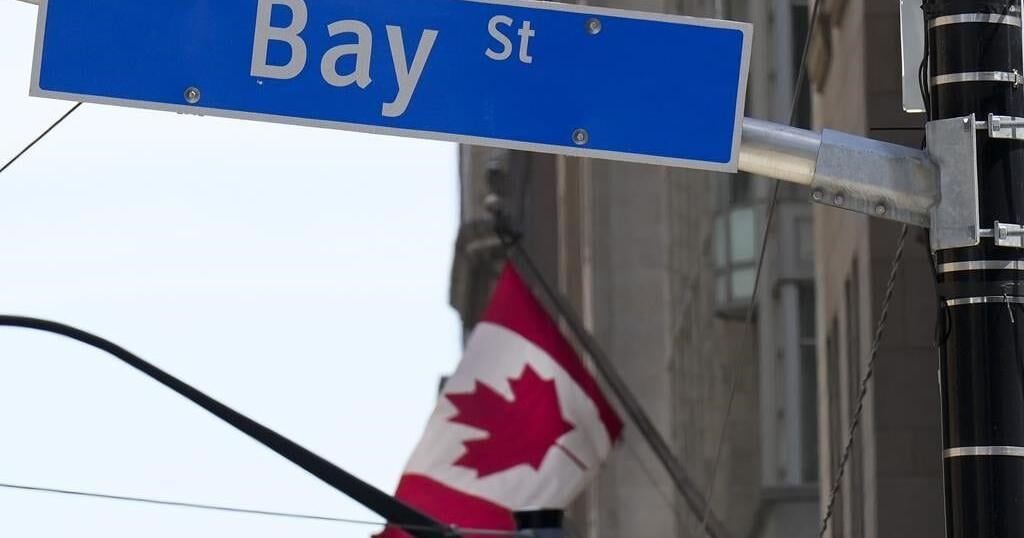Shockwaves on Wall Street unleashed by jobs data out of the U.S. sent strong tremors north of the border Friday, as Canada’s main stock index shook over fears of a weakening U.S. economy and tech sector.
The S&P/TSX composite index plunged 495.58 points to close at 22,227.63.
In New York, the Dow Jones industrial average sank 610.71 points to 39,737.26. The S&P 500 index decreased 100.12 points to 5,346.56, while the Nasdaq composite plummeted 417.98 points to 16,776.16 — down roughly 10 per cent from its July high.
Friday’s declines followed a report showing U.S. job growth slowed sharply last month and the unemployment rate jumped to 4.3 per cent, its highest level since October 2021.
The ripple effect on Bay Street reflected a global selloff of stocks sparked by the lacklustre hiring numbers out of the United States and lent weight to worries the U.S. Federal Reserve was behind the curve on interest rate cuts, said Brianne Gardner, senior wealth manager at Velocity Investment Partners with Raymond James Ltd.
“Canada has already done two cuts, but the Fed is notorious for waiting too long to make interest rate decisions until it’s too late,” she said.
Meanwhile, disappointing earnings from technology heavyweights continued a dispiriting run that kicked off last week with results from Tesla and Alphabet and aggravated concerns that stocks had climbed too high on the heady excitement surrounding artificial intelligence.
“That has added fuel to the equities selloff as well,” Gardner said.
Amazon shares fell almost nine per cent Friday after the e-commerce giant reported weaker-than-expected revenue for its latest quarter and predicted profits that fell short of analysts’ forecasts.
Meanwhile, Intel shares dropped about 26 per cent, marking its worst day in 50 years amid underwhelming profits and earnings forecasts.
On the economic front, the disappointing U.S. jobs report Friday followed a batch of weaker-than-expected reports on the economy from a day earlier, including a worsening reading on U.S. manufacturing activity, which has been one of the areas hurt most by high rates.
Only two days ago U.S. stock indexes jumped to their best day in months after Federal Reserve Chair Jerome Powell gave the clearest indication yet that inflation has slowed enough for rate cuts to begin in September.
Now, worries are rising the Fed may have kept its main interest rate at a two-decade high for too long. A cut would make it easier for households and companies to borrow money and boost the economy, but it could take months to a year for the full effects to filter through.
Broader anxieties are also fanning the flames: “missed earnings, U.S. election uncertainty, geopolitical tensions: all of these weathered together — and also coming into the two weakest months of the year, August and September historically,” Gardner said.
The market was overdue for a correction, she added.
“I think this is healthy for markets after the run-up that they’ve had.”
In Canada, the tech and energy sectors fell 4.5 per cent and 4.3 per cent, respectively, while finance, health care and base metals dropped sharply as well.
“Oil prices are below $80 and there’s still concerns about demand in the U.S. and China,” Gardner said.
The share-price gut punch could offer an upside in recovery.
“I think there is an opportunity to pick up some energy stocks,” she said.
Meanwhile, other sectors are poised to benefit from expected rate cuts north and south of the border.
“When interest rates are coming down, telcos tend to do well. Same thing with utilities,” Gardner said. Known for their capital-intensive operations and attendant borrowing, both sectors rebounded on Friday.
“Now is a good time to get into some of these sectors that we think could ride this momentum on additional rate cuts out of both Canada and the U.S.,” Gardner said.
The Canadian dollar traded for 72.16 cents US compared with 72.22 cents US on Thursday.
The September crude oil contract was down US$2.79 at US$73.52 per barrel and the September natural gas contract was unchanged at US$1.97 per 1,000 cubic feet.
The December gold contract was down US$11 at US$2,469.80 an ounceand the September copper contract was up two cents at US$4.10 a pound.
— With files from The Associated Press
This report by The Canadian Press was first published Aug. 2, 2024.
Companies in this story: (TSX:GSPTSE, TSX:CADUSD)
